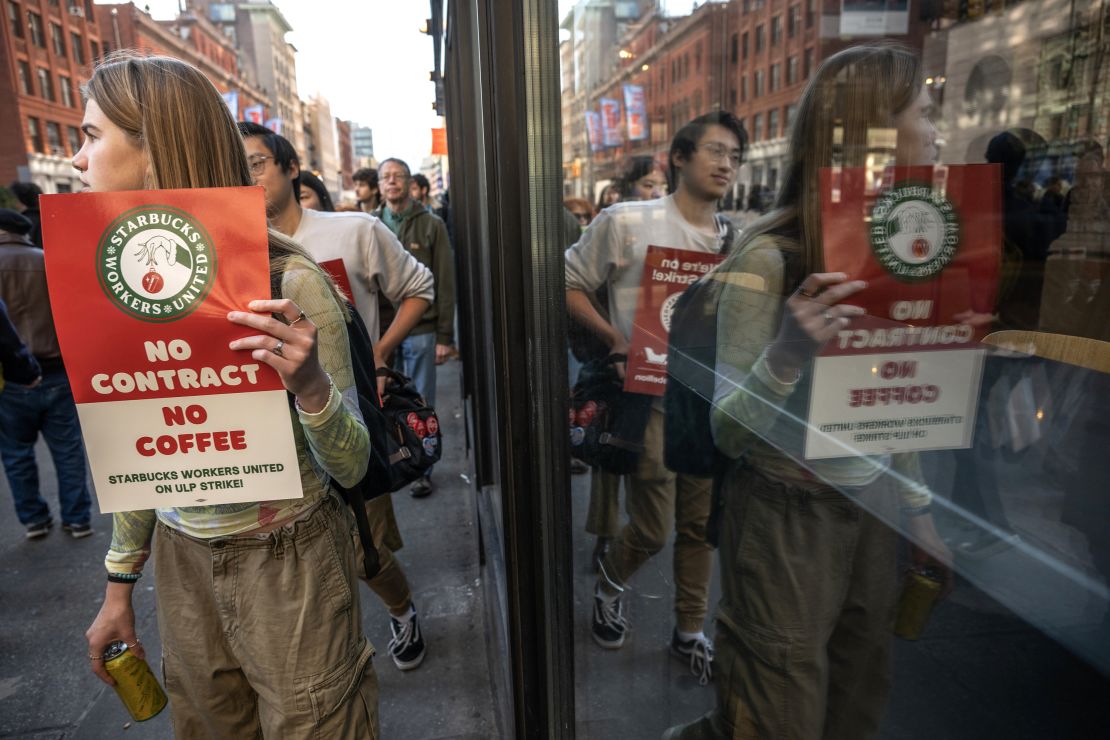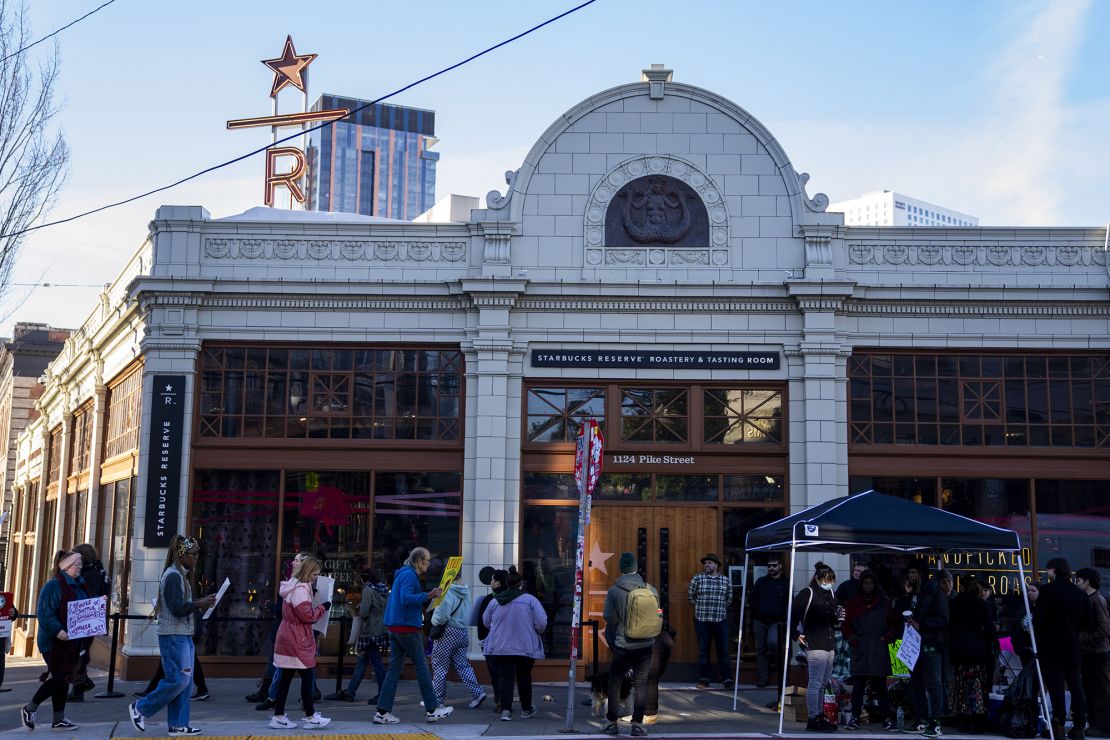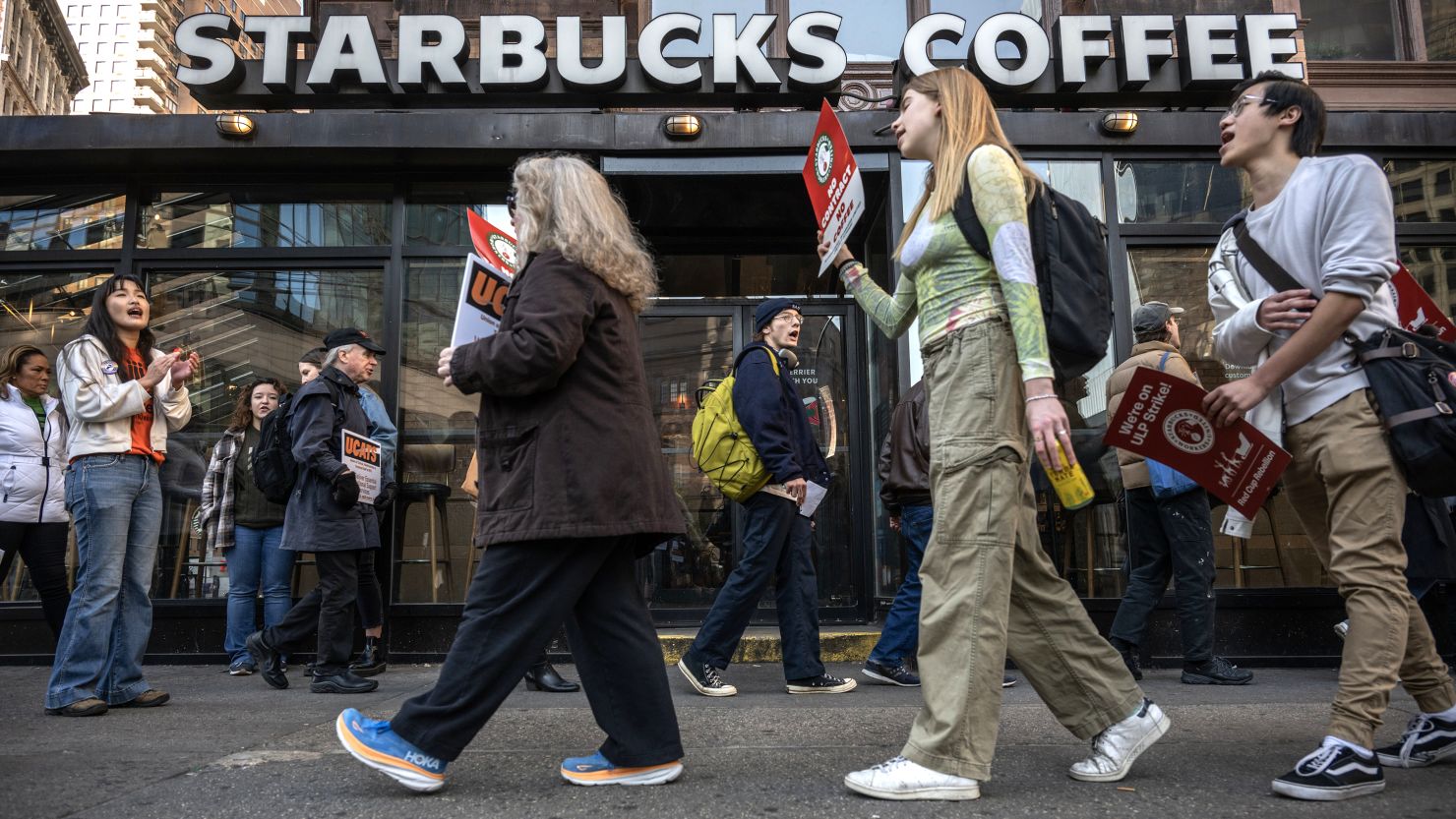Thousands of Starbucks workers at hundreds of stores went on strike Thursday, as they protested the lack of their first contract despite a nearly two-year organizing drive.
The strike at Starbucks, which some have dubbed the Red Cup Rebellion, was intended to last just one day, unlike recent strikes by the United Auto Workers union at the nation’s three unionized automakers or strikes by SAG-AFTRA and the Writers Guild of America, which shut down production of many movies and television shows.
But the union said the limited-duration strike on a key promotion day for Starbucks is important in its efforts to win their first contract at the chain. And it is a sign that even with more than 200,000 strikers leaving picket lines in the last month, that there are levels of union activism at America’s workplaces that haven’t been seen in decades.
The union, Starbucks Workers United, won its first representation vote at the company in December 2021, at a store in Buffalo, New York. Since then, it has won more votes at 368 other stores out of 454 elections. But there are still no contracts for any of the more than 9,000 union members spread across the stores.

This is the second year in a row that the union has staged widespread walkouts and protests to coincide with the company’s “Red Cup Day” promotion, when it sells its re-usable holiday cups.
But many of the stores on strike remained open in past strikes, because management replaced the unionized striking workers with workers from nearby non-union stores and managers. That’s possible because of the close proximity of many Starbucks stores to one another. The union said even if the unionized stores stay open, the picket lines allow them to get their message out to Starbucks customers, many of whom they said are sympathetic to their cause.
Moe Mills works at a unionized Starbucks location in St. Louis, Missouri. Seven unionized locations in the city are planning to shut down on Thursday, Mills, who uses they/them pronouns, told CNN Tuesday.
“We plan for our store to not even open,” on Thursday, they said. “The workers will not be there.”
Mills participated in the “Red Cup” day protest last year, scheduled to coincide with a promotional event run by the company, during which it gives out the reusable holiday cups with certain drink purchases.
The experience allowed Mills to talk to customers about what they say the union is fighting for. “Looping [customers] in on what’s going on is wildly important,” they said. Starbucks doesn’t “listen to their workers, but they have to listen to their customers,” Mills added.
While the company continues to challenge some of the votes and is seeking new votes to oust the union at some stores, the National Labor Relations Board, the federal agency which oversees labor relations at most business, has certified 363 stores as being union represented, or more than one every other day since the first election. And the NLRB has so far rejected efforts to oust the union at some stores, citing the lack of progress on negotiating a new contract.
The company and union blame one another for the lack of progress in negotiations.
“We remain committed to working with all partners, side-by-side, to elevate the everyday, and we hope that Workers United’s priorities will shift to include the shared success of our partners and negotiating contracts for those they represent,” said a statement from the company, which uses the term “partners” to describe its employees. “Starbucks remains ready to progress in-person negotiations with the unions certified to represent partners.”
But the union insists it is the company that is the obstacle to reaching its first contract. The union earlier this fall filed an unfair labor practice charge with the NLRB over Starbucks’ refusal to bargain around promotion days.

“Promotion days like Red Cup Day and Buy One Get One Free offers cause a flood of customers to stores, without any additional staffing to cover the influx in orders,” said the union’s statement. “On Red Cup Day, drink orders pile up and are abandoned, lines are out the door, and Starbucks workers are left to handle angry customers who have had to wait as much longer than usual for their beverages and food all while trying to make complicated holiday specialty beverages as fast as possible. When the supply of red cups runs out, customers get disappointed and often take their anger out on workers.”
Limited duration strikes like the one at Starbucks, or the three-day strike at Kaiser Permanente last month have become a major tool in union’s efforts to flex their muscles. And while the deals haven’t resulted in a contract at Starbucks, they did win a labor deal for more than 75,000 union workers at Kaiser Permanente, and 30,000 non-teaching employees who went on strike in March at Los Angeles schools
Besides the auto deals and the actors and writers labor agreements that ended those strikes, some other major work stoppages have been averted by 11th hour labor deals, most notably the deal that covered 340,000 Teamsters at UPS in late July ahead of an August 1 strike deadline. A series of deals earlier this month covering nearly 40,000 workers at 18 casinos along the Las Vegas Strip.
But there are still other workers remaining on strike, including nearly 4,000 union members at three casinos in Detroit and more than 1,000 workers at Michigan Blue Cross-Blue Shield. Both groups have been on strike for more than a month.
Meanwhile, a number of major contracts due to expire in the next year include one covering 30,000 assembly line workers at Boeing and another covering 45,000 dockworkers at East Coast ports, both expiring in September.









